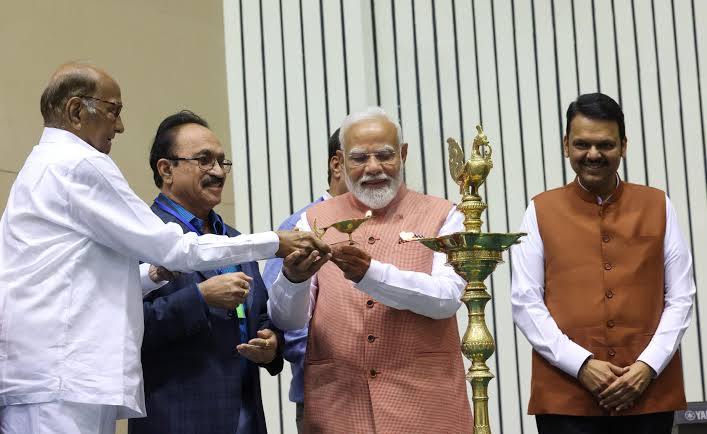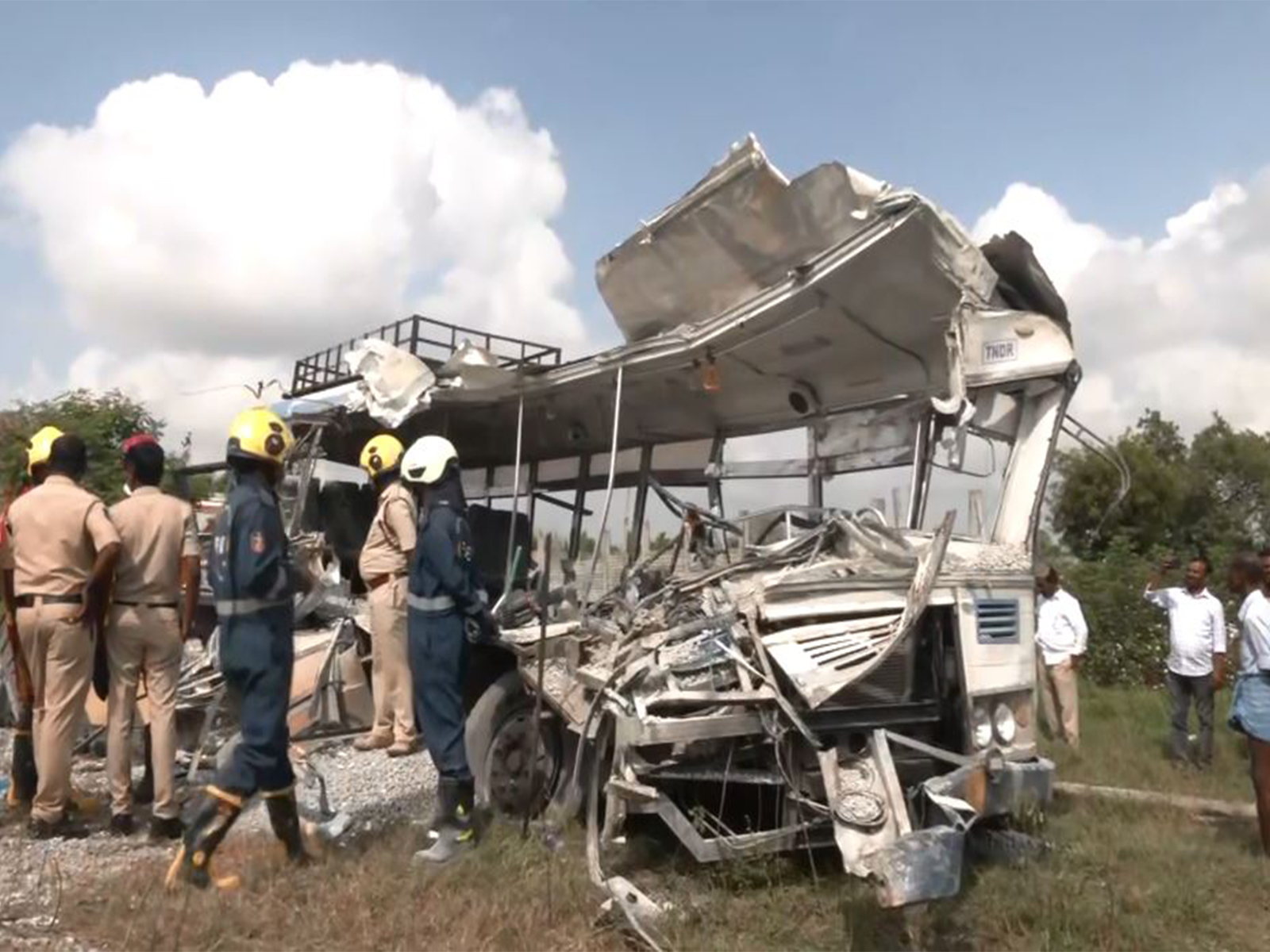In a grand celebration of language, literature, and culture, Prime Minister Narendra Modi inaugurated the 98th Akhil Bharatiya Marathi Sahitya Sammelan at Vigyan Bhawan in New Delhi. Welcoming Marathi enthusiasts from across the country and beyond, he emphasized that the Sammelan is not just a linguistic gathering but a testament to India’s freedom struggle and Maharashtra’s rich cultural legacy.
 Reflecting on the Sammelan’s 147-year journey since its inception in 1878, the Prime Minister recalled the contributions of literary stalwarts such as Mahadev Govind Ranade, Hari Narayan Apte, Veer Savarkar, and many others who shaped Marathi literature and thought. Expressing his gratitude for being invited by veteran leader Sharad Pawar to the event, he congratulated Marathi speakers worldwide for their deep-rooted literary and cultural contributions.
Reflecting on the Sammelan’s 147-year journey since its inception in 1878, the Prime Minister recalled the contributions of literary stalwarts such as Mahadev Govind Ranade, Hari Narayan Apte, Veer Savarkar, and many others who shaped Marathi literature and thought. Expressing his gratitude for being invited by veteran leader Sharad Pawar to the event, he congratulated Marathi speakers worldwide for their deep-rooted literary and cultural contributions.
The occasion held special significance as it coincided with International Mother Language Day. Quoting the revered Marathi saint and poet Sant Dnyaneshwar, Modi described Marathi as sweeter than nectar and expressed his deep respect for the language. He humbly acknowledged his ongoing efforts to learn Marathi, despite not being as proficient as the scholars present.
This year’s Sammelan comes at a historic moment, aligning with the 350th anniversary of Chhatrapati Shivaji Maharaj’s coronation, the 300th birth anniversary of Punyashlok Ahilyabai Holkar, and the 75th anniversary of India’s Constitution, shaped under the leadership of Dr. B.R. Ambedkar. Modi also highlighted the centenary of the Rashtriya Swayamsevak Sangh (RSS), founded in Maharashtra, and its role in carrying forward India’s cultural traditions.
A key highlight of the event was the recognition of Marathi as a classical language, a long-awaited honor for over 12 crore Marathi speakers. Modi described this acknowledgment as one of the most significant milestones of his tenure, reinforcing Marathi’s historical and literary significance.
He spoke passionately about the power of language, calling it not just a means of communication but a carrier of culture. Marathi, he said, has been a medium for expressing India’s spiritual, intellectual, and nationalistic ideals. He recounted how Maharashtra’s saints—Dnyaneshwar, Tukaram, Namdev, and others—used Marathi to spread spiritual wisdom, while modern writers like Gajanan Digambar Madgulkar and Sudhir Phadke have enriched it further through works like Geet Ramayan.
The Prime Minister also highlighted the deep connection between Marathi and India’s struggle for independence. He paid tribute to revolutionaries like Vasudev Balwant Phadke, Lokmanya Tilak, and Veer Savarkar, who used Marathi literature and newspapers like Kesari and Maratha to ignite patriotic fervor. He also acknowledged how literary figures like Govindagraj and Ram Ganesh Gadkari infused nationalist spirit through poetry and drama.
Marathi literature has been a force for social reform as well. Modi praised the contributions of Jyotiba Phule, Savitribai Phule, Maharshi Karve, and Dr. Ambedkar, who used Marathi to advocate for social justice and upliftment of marginalized communities. He pointed out that Marathi’s progressive nature has even paved the way for genres like science fiction in Indian literature.
The Prime Minister also recognized Maharashtra’s unparalleled contributions to India’s economy and popular culture. He acknowledged Mumbai’s role as the country’s financial hub and its impact on cinema, both Marathi and Hindi. He cited the recent popularity of the film Chhava, based on Shivaji Sawant’s Marathi novel, as an example of how literature continues to inspire new generations.
Discussing the evolution of languages, he quoted poet Keshavsut, emphasizing that civilizations, thoughts, and languages must continually evolve. India’s linguistic diversity, he noted, has never been a cause for division but rather a foundation of unity. He reminded the audience that Marathi, like many Indian languages, has been enriched by Sanskrit and Prakrit influences. The exchange between languages, he said, has strengthened Indian literature as a whole, citing translations of literary classics across languages as a testament to this shared heritage.
Modi also warned against attempts to create linguistic divisions, stressing that all Indian languages are integral to the nation’s identity. He highlighted government efforts to promote education in regional languages, including Marathi, ensuring that students can now pursue higher education, engineering, and medical studies in their mother tongue.
Concluding his speech, the Prime Minister underscored the critical role of literature in shaping society. He expressed confidence that the Akhil Bharatiya Marathi Sahitya Mahamandal would continue the legacy of visionaries like Ranade, Apte, Acharya Atre, and Veer Savarkar. Looking ahead to the 100th Sammelan in 2027, he urged preparations to make it a milestone event. Recognizing the contributions of young Marathi writers and social media influencers in promoting the language, he encouraged greater digital initiatives for Marathi learning.
The event was attended by Maharashtra Chief Minister Devendra Fadnavis, Rajya Sabha MP Sharad Pawar, and Dr. Tara Bhawalkar, the Sammelan’s president, along with prominent literary figures and dignitaries.
The three-day Sammelan, taking place from February 21 to 23, features a vibrant lineup of panel discussions, book exhibitions, cultural performances, and interactive sessions with eminent authors. This year’s gathering is especially historic as it is being hosted in the national capital after 71 years. In a unique tribute to Marathi’s unifying spirit, 1,200 participants traveled from Pune to Delhi on a symbolic “literary train journey.” The event also includes over 2,600 poetry submissions, 50 book launches, and 100 book stalls, reflecting the dynamic and ever-growing influence of Marathi literature.




